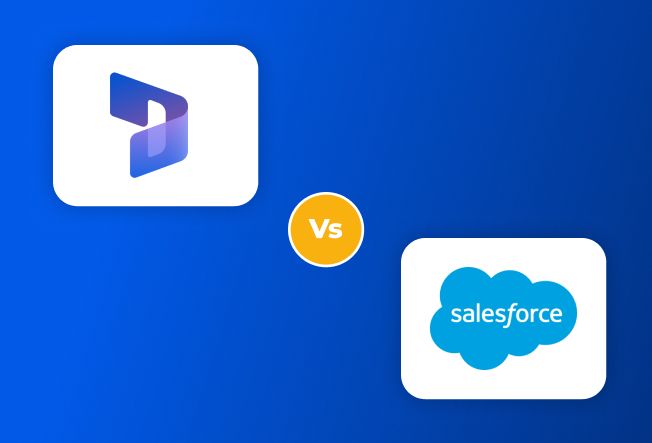Top Challenges Solved by D365 Retail and Commerce
Nov 28, 2023 Aiswarya Madhu
In the world of retail, every shelf tells a story, every customer craves a personal touch, and inventory management demands a harmonious rhythm. Retail landscape is a labyrinth of complexities where success hinges on solving the puzzles of inventory, personalization, and omnichannel retail. This is where D365 Retail and Commerce steps in, offering solutions to these complex challenges.
What is D365 Retail and Commerce Module?
Microsoft Dynamics 365 Retail and Commerce module is a comprehensive suite designed to enhance e-commerce operations and customer experiences across retail sectors. It integrates functionalities from back-office to in-store and digital platforms, including e-commerce, call centers, and more. Here are the core features and benefits:
Brand Loyalty
Enhances customer relationships through personalized engagements.
Revenue Growth
Increases profitability by improving employee productivity.
Operational Efficiency
Reduces operational costs and optimizes supply chain management.
Adaptive Shopping Experience
Seamlessly integrates physical and digital channels to meet changing consumer demands.
Supply Chain and Manufacturing Insights
Utilizes predictive analytics to refine supply chain and manufacturing processes.
Financial Automation
Modernizes and automates financial operations globally.
Workforce Optimization
Reduces workforce costs and fosters a high-performance culture.
Loyalty Programs
Rewards customer loyalty to engage and retain patrons.
Point-of-Sale (POS)
Streamlines sales transactions for efficiency.
Inventory Management
Maintains accurate stock levels for better management.
Customer Relationship Management (CRM)
Manages and enhances customer interactions and satisfaction.
6 Challenges that D365 Retail and Commerce Solve
Challenge 1: Inventory Management Complexities
Managing inventory manually can be time-consuming and prone to errors. With Dynamics 365 for Retail, inventory management becomes streamlined and efficient. By seamlessly integrating data from various systems like POS, e-commerce platforms, and warehouse management, it provides real-time visibility into stock levels. Let’s see in detail how Dynamics 365 for Retail helps to solve inventory management complexities
Visibility Across Platforms: Dynamics 365 integrates seamlessly with various systems across different retail locations and sales channels. By pulling data from point-of-sale (POS) systems, e-commerce platforms, and warehouse management systems, it provides real-time visibility into stock levels. Retailers can monitor stock movements and make informed decisions regarding restocking or order fulfillment without manual data entry.
Demand Forecasting: With the power of artificial intelligence and machine learning, Dynamics 365 analyzes historical sales data, market trends, and customer behavior. This allows retailers to forecast demand accurately. By integrating data from customer relationship management (CRM) systems and sales history, it predicts what customers are likely to purchase. When combined with supplier data, it even factors in lead times for restocking, ensuring that the right products are available when customers need them.
Automated Reorder Points: Dynamics 365 for Retail integrates with procurement systems and suppliers' databases. When inventory levels drop below predefined reorder points, the system automatically generates purchase orders. This integration minimizes delays and ensures products are restocked efficiently. Retailers no longer need to rely on manual order creation, reducing the chances of errors and delays.
Inventory Optimization: Microsoft Dynamics 365 also integrates with financial systems and enterprise resource planning (ERP) solutions. This enables retailers to optimize inventory by considering factors such as storage costs, holding periods, and sales velocities. By fine-tuning inventory levels, it strikes a balance between maintaining adequate stock and preventing excess inventory. The integration with accounting systems helps in cost analysis and better inventory control.
Explore the transformative power of Dynamics 365 Field Service in our latest blog. Learn how its seamless implementation revolutionizes work order management, empowering businesses to streamline tasks and boost operational efficiency effortlessly.
Challenge 2: Inconsistent Display of Merchandise
Maintaining consistent product displays across different sales channels is crucial for brand identity and it could be a challenge if you’re maintaining and updating them manually.D365 Retail and Commerce module centralizes product data management, ensuring uniform product descriptions, images, and specifications. This standardized approach ensures a cohesive and appealing presentation for customers across all platforms, reinforcing brand recognition and trust.
Let’s see how Dynamics 365 for Retail helps with consistent display of merchandise:
Streamlining Product Presentation for Consistency and Appeal: With Dynamics 365 for Retail, you can establish standardized templates for product displays. These templates ensure that product descriptions, images, and specifications are consistently presented across all sales channels. Whether a customer is shopping online or in a physical store, they will encounter a uniform and visually appealing representation of your products. This streamlining enhances brand identity and helps customers quickly recognize and engage with your merchandise.
Implementing an Effective Pricing Strategy: Inconsistent pricing can create confusion and erode customer trust. Dynamics 365 for Retail for e-commerce allows you to centralize your pricing strategy. You can easily manage and update prices for products across various channels. The system ensures that customers see the correct, up-to-date pricing information. Whether you're running a promotion or adjusting prices due to market factors, this tool empowers you to maintain pricing consistency and transparency.
Centralizing Product Category Management: Keeping product categories organized and uniform is essential for a seamless shopping experience. Dynamics 365 for Retail offers centralized product category management. You can categorize products logically and consistently. This categorization simplifies the shopping process for customers, as they can easily navigate through your product catalog. It ensures that related items are grouped logically, making cross-selling and upselling opportunities more visible.
Aligning Product Offerings with Customer Preferences: Successful retail hinges on understanding your customers' preferences. Dynamics 365 for Retail collects and analyzes customer data to gain insights into their buying habits and preferences. By aligning your product offerings with these preferences, you can create a more personalized shopping experience. For instance, if the system identifies a customer's interest in a specific product category, it can recommend related items, increasing the likelihood of a sale. This alignment between customer preferences and product offerings enhances customer satisfaction and loyalty.
Ready to elevate your retail game?
Unlock success with D365 Retail and Commerce
Challenge 3: Personalization Based on Order History
Personalizing offerings based on order history requires a strategic approach. D365 for Retail excels by leveraging customer data and insights. This includes identifying upselling opportunities, automating cross-selling for complementary products, and deploying personalized email campaigns, including abandoned cart reminders.
Let’s see in detail how Dynamics 365 for retail helps to streamline personalization:
Identifying Upselling Opportunities: Dynamics 365 leverages order history to identify opportunities for upselling, aiming to increase order sizes. By analyzing past purchases and customer behavior, the system suggests relevant and complementary products that align with the customer's buying patterns, encouraging them to add more items to their cart.
Automating Cross-Selling: Utilizing order history and customer preferences, Dynamics 365 automates cross-selling by recommending complementary products to customers. When customers browse or purchase specific items, the system suggests related or complementary products, enhancing the shopping experience and potentially increasing the order value.
Personalized Email Campaigns: Dynamics 365 enables the automation of personalized email campaigns, including abandoned cart reminders. Leveraging data on abandoned carts or browsing history, the system sends targeted and personalized emails to customers, encouraging them to complete their purchase or suggesting relevant products based on their interests and previous interactions.
Explore the transformative power of Dynamics 365 Fleet Management through a compelling case study. Discover how this solution revolutionizes fleet operations, boosts efficiency, and drives success in the transportation industry.
Challenge 4: Elevating Omnichannel Experience
Inconsistent Data across Channels: The problem of inconsistent data across various sales channels is a common challenge in omnichannel retail. To address this issue, D365 Retail and Commerce offers a centralized data management system. It ensures that product information, pricing, inventory levels, and customer data are synchronized across all sales channels. This means that whether a customer interacts with your brand in a physical store, on your website, or through a mobile app, they will encounter the same product details, pricing, and availability. The key here is real-time data synchronization and a unified product information management system, guaranteeing that customers receive consistent and accurate information, regardless of the sales channel they choose.
Creating Seamless Shopping Experiences Across Physical Stores, Web, and Mobile:
Achieving a seamless shopping experience requires a harmonious blend of offline and online retail. Dynamics 365 for Retail helps retailers by integrating various sales channels, offering features like "buy online, pick up in-store" (BOPIS), in-store kiosks, and mobile apps. This way, customers can start their shopping journey on one channel and seamlessly transition to another without any disruption. For instance, a customer can browse products on your website, add items to their cart, and then choose to complete the purchase in a physical store or via a mobile app. The key is to ensure that customers can shop how they want, where they want, with a consistent and convenient experience that transcends the limitations of individual channels. By connecting these touchpoints, Dynamics 365 for Retail ensures that retailers can offer a truly omnichannel experience to their customers.
Dive into seamless customer service excellence with our quick guide on getting started with Dynamics 365. Uncover powerful insights and strategies to elevate your customer service experience, making every interaction a success.
Challenge 5: Return & Refund
Handling returns manually can be complex. D365 for Retail simplifies this process by employing the "Credit Note" action.
Here’s how this feature helps to ensure unhindered return process:
Efficient Charge Offsets: Dynamics 365 for Retail also streamlines charge offsets and modifications from vendor invoices. This process ensures that discrepancies or changes in charges are managed seamlessly, aligning with the terms mentioned in the original invoice. By maintaining accurate replication of vendor invoice data for return orders, it ensures compliance and accuracy throughout the return process.
Accurate Inventory Management: During return confirmation, the system maintains accurate inventory by marking transactions. This ensures that inventory levels are updated in real time, providing clarity and accuracy in inventory management. Additionally, it generates transparent product receipt journals, organizing return management efficiently. These journals offer a clear view of returned items, aiding in tracking and managing inventory.
Challenge 6: Predicting Evolving Customer Requirements
In anticipation of evolving customer needs, D365 Retail and Commerce provides dynamic insights by offering predictive and personalized insights into customer preferences. Let's delve into how Dynamics 365 for Retail accomplishes this.
Predictive and Personalized Insights: Dynamics 365 for Retail empowers retailers with predictive and personalized insights into customer preferences. By leveraging collected data, it provides valuable insights into evolving customer needs and preferences. These insights help in understanding buying patterns, enabling retailers to anticipate and adapt to changing customer demands.
Continuous Adaptation of Offerings: The platform enables continuous adaptation of products, their presentation, sequencing, and pricing based on real-time insights. By utilizing machine learning algorithms and predictive analytics, it assists in dynamically configuring offerings to align with evolving customer preferences. This agility allows retailers to stay ahead by swiftly adjusting their strategies to meet changing market demands.
Real-time Visibility and Data Management: Retailers gain real-time visibility into product, customer, inventory, and order data using robust tools integrated within Dynamics 365. This visibility enables quick decision-making by providing up-to-date information across all facets of retail operations. Efficient data management ensures that retailers have the insights needed to optimize offerings and customer experiences.
Diverse Loyalty Programs Management: Dynamics 365 facilitates the efficient configuration and management of diverse loyalty programs. By leveraging comprehensive tools, retailers can tailor loyalty programs to suit various customer segments. These programs help enhance customer engagement and brand loyalty by rewarding customers based on their preferences and behavior.
Unlock the power of Dynamics 365 with the right support partner by your side. Discover key insights and essential tips to navigate and choose the perfect Microsoft Dynamics 365 support partner tailored to your business needs.
For retailers aspiring to elevate their business to new heights, the key lies in embracing the transformative capabilities of D365 Retail and Commerce. Get in touch with Nalaasha Digital to embark on a journey of implementing or customizing Dynamics 365, ensuring your retail business scales new heights of success.
Recent Posts

D365 vs Salesforce [Survive with the Most Adaptable Solution]
Jul 12, 2024

Can Dynamics 365 Be Used as a Ticketing System?
Jul 11, 2024

Top 20 Dynamics 365 Supply Chain Management Features
Jul 09, 2024
Category
Our Expertise
About Author

Aiswarya Madhu
In the ever-changing tech landscape, my mission is to craft content that simplifies complex concepts and brings the wonders of modern technology closer to my audience. With a rich experience spanning over 2 years, I have honed my skills in crafting captivating and informative content for B2B domain that deeply resonates with the tech-savvy audience. When not working, you'll often find me with a steaming cup of tea and an inspiring book, fueling my curiosity and passion for knowledge.
Never Miss News
Want to implement Dynamics 365?
We have plans which will meet your needs, and if not we can tweak them around a bit too!


